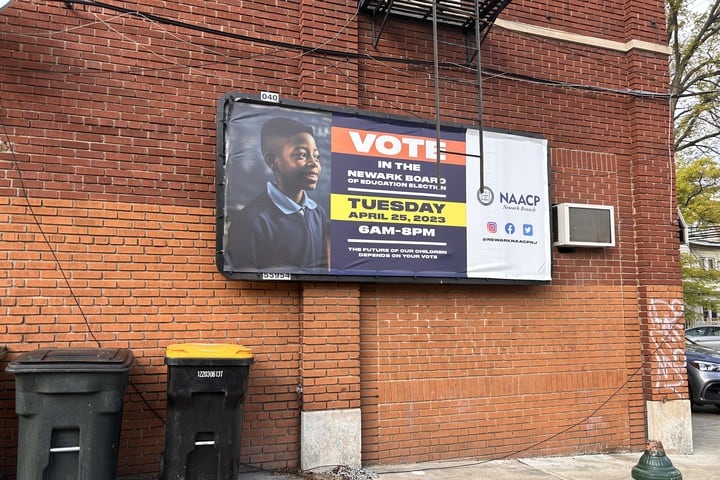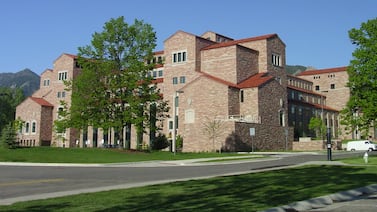Two incumbents on the Newark Board of Education won Tuesday’s election alongside their newcomer running mate as voters chose to keep the status quo among the board.
With roughly 94% of voting districts reported, 87% of voters also chose to pass Newark Public Schools’ $1.3 billion budget.
The “Moving Newark Schools Forward” slate, which was endorsed by Mayor Ras Baraka and other local and state leaders, secured three seats in a landslide win, according to preliminary results posted Tuesday night.
Their victory comes amid growing concern over the board’s transparency in decision-making, increasing rates of chronic absenteeism, and plans to support the district’s most vulnerable students. All eight candidates expressed disappointment in voter turnout and engagement as just over 3% of Newark voters participated in elections again.
Incumbents Josephine Garcia and Hasani Council received the bulk of the votes, each garnering roughly 23%. Their running mate Allison James-Frison, who had an unsuccessful run last year, received 22% as of Tuesday evening.
The latest numbers show sweeping victories over the three-member “Newark Kids Forward” slate, which combined, garnered less than a quarter of votes. Thomas Luna and James Wright Jr. each had roughly 8% of the votes, while Tawana Johnson-Emory had just under 7%, according to preliminary results.
Independent candidates Latoya Jackson, a hair salon owner, received less than 4% of votes and Ade’Kamil Kelly, a real estate agent and team leader at the Boys and Girls Club of Newark had just under 3%, according to the Tuesday night’s results.
Historically, voter turnout for the annual school board election has been low. Last year, roughly 3% of registered voters cast their vote. The county reported that just over 3%, or 4,963 Newark voters, participated in this year’s election. County data showed there were 9,578 in-person votes and 3,652 mail-in votes cast as of Tuesday evening.
Candidates discussed their efforts to engage voters in this year’s election and reverse Newark’s history of low voter participation. Garcia and her team visited churches, knocked on doors, handed out flyers, and recruited dozens of volunteers to help bring residents to the polls. With a third run for the board of education member, Garcia, who secured a third term on the board this year, said school board elections are “the hardest and most exhausting” of all races to get parents and the community to participate. She suggested moving the school board race to November.
In 2012, the state legislature passed a law allowing districts to switch their school board elections to the November general election. Until then, all school board elections were held in the spring and voters had a say on school budgets. Now only voters whose districts hold elections in April get to vote on school budget.
James-Frison also said she was shocked by the low turnout despite her slate’s efforts to get residents to vote. She hopes the community will engage in important school issues such as mental health, which she plans to tackle once she takes her seat on the board.
“I’d like to see more resources and services for not just students, but for the teachers and the parents because we all have to work together to make sure everybody’s mental stability is OK,” James-Frison said.
Like other candidates, Luna and his “Newark Kids Forward” slate knocked on doors and walked around neighborhoods to let people know about Tuesday’s election. Luna wasn’t surprised about the low voter turnout given his history of running in Newark’s school board elections but heard about issues with provisional ballots and people being directed to other voting locations the day of.
“Folks at Avon Avenue School, which is a typical voting location, were told it’s moved to Belmont Runyan. And that was like a very unpleasant surprise because nobody had known,” Luna said.
The Essex County election’s office did not respond to comments about Newark voting discrepancies at the time of publishing.
The issues Luna described could’ve helped increase voter turnout but as a two-time school board candidate, he feels there’s more to getting people engaged. He doesn’t think low voter turnout suggests residents don’t care.
“I think, for all of us involved with any of this work that is one of the underlying questions that we have to figure out because democracy does not survive when less than 10% of people are participating in it,” he said.
Those that ran independently also expressed concern over the community’s lack of engagement during the election. Jackson, who owns a hair salon in the West Ward, said it was hard to spread the word about her run for school board as a team of one. The lack of understanding and awareness about Newark’s school policies made it hard to get people in the neighborhood engaged in the election, Jackson said.
But what inspired her to run was her negative experience with her son’s discipline at Central High School and the need to feel heard as a parent and community member. This year’s election inspired her to go back to school and become more educated on civic matters.
“I don’t want to see our community separated. I don’t want to see us fighting each other,” Jackson added. “I want us to be educated and I feel like anything that makes you mad, should make you change something.”
The Newark Board of Education will meet on Thursday, May 11 for its annual reorganization board meeting.
Correction: April 28, 2023: About 3.1% of voters participated in this year’s school board election and roughly 3% of voters participated in the 2022 school board election. A previous version of this story said that just under 3% of Newark voters participated in this year’s election.
Jessie Gomez is a reporter for Chalkbeat Newark, covering public education in the city. Contact Jessie at jgomez@chalkbeat.org.





